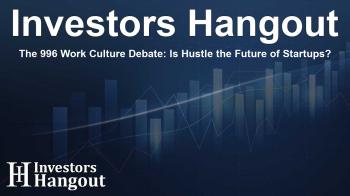The 996 Work Culture Debate: Is Hustle the Future of Startups?

Understanding the 996 Work Culture Phenomenon
Venture capitalist Harry Stebbings has recently sparked conversations about the work culture necessary to create billion-dollar startups. He emphasizes that a commitment to working seven days a week is crucial for those aiming to build companies of significant scale and presence. In today's landscape dominated by AI and technological advancement, he insists that meeting the demands of the market requires an intense dedication that transcends the traditional 9 to 5 schedule.
The Rise of the Startup Hustle
In his view, those who clock out at 5 PM are unlikely to lead the next wave of transformative companies. Stebbings highlights the intense competition faced by European startups from teams in Silicon Valley and China, where a relentless work ethic is often the norm. His remarks drew significant attention on social media, and he admits he was taken aback by the backlash, with many labeling his stance as toxic and harmful.
Engaging the Critics
Critics of Stebbings argue that the focus should not solely be on grueling hours but rather on fostering an environment that promotes innovation and sustainability. They highlight the need for balance and the importance of mental well-being, suggesting that Europe should encourage creativity rather than pushing its founders to the brink of burnout.
Examining the 996 Ethos
Stebbings references the 996 working hour system from China, which involves working from 9 AM to 9 PM, six days a week. While this practice remains controversial, it has been associated with several high-growth companies in the tech sector. He cautions against adopting this culture without considering necessary breaks and downtime for personal wellness. Stebbings clarifies that while hard work is indispensable, neglecting crucial aspects of life such as family time and self-care can be detrimental in the long run.
The Argument for Tough Love
His assertion is that speed is the defining factor between success and mediocrity within the startup ecosystem. He shares his experiences visiting bustling tech cities where the prevailing attitude emphasizes hard work as the cornerstone of success. Stebbings does advocate for a nuanced approach, acknowledging that it's possible to work hard while still maintaining some level of personal quality time.
Voices Aligning with Stebbings
Stebbings is not the only figure advocating for a demanding work ethic. Notably, Shark Tank investor Kevin O’Leary recently voiced concerns regarding the entrepreneurial spirit in today's workforce, suggesting that only a fraction of individuals possess the determination needed to succeed as entrepreneurs.
Is Balance an Illusion?
Similarly, Lucy Guo, co-founder of Scale AI, has expressed skepticism about work-life balance for entrepreneurs, declaring that 90-hour workweeks should be the standard for success in the startup realm. This sentiment is echoed by others in leading firms, including Google co-founder Sergey Brin, who views a 60-hour work week as the optimal standard for productivity.
Reflecting on the 996 Work Culture Discussion
As we move forward, the ongoing discussion surrounding the 996 work culture raises essential questions about the definitions of success and sacrifice in the entrepreneurial world. While hard work can undoubtedly lead to achievement, it's crucial to find ways to integrate personal well-being into the hustle. The path to innovation and disruption in the market requires both dedication and an understanding of when to step back.
Frequently Asked Questions
What is the 996 work culture?
The 996 work culture refers to a schedule of working from 9 AM to 9 PM, six days a week, commonly practiced in some Chinese tech companies.
Who is Harry Stebbings?
Harry Stebbings is a venture capitalist known for his views on the commitment and work ethic necessary for achieving significant startup success.
Why is the 996 work culture controversial?
The 996 work culture is contentious because it can lead to burnout and poor mental health, contrasting sharply with increasing calls for work-life balance.
How do European startups compare to those in Silicon Valley?
European startups often face tougher competition from Silicon Valley due to differing work cultures, with the latter typically exhibiting a more aggressive dedication to long hours.
Is hard work the only factor in startup success?
While hard work is vital, other factors such as creativity, market understanding, and balance are essential for sustainable success.
About The Author
Contact Olivia Taylor privately here. Or send an email with ATTN: Olivia Taylor as the subject to contact@investorshangout.com.
About Investors Hangout
Investors Hangout is a leading online stock forum for financial discussion and learning, offering a wide range of free tools and resources. It draws in traders of all levels, who exchange market knowledge, investigate trading tactics, and keep an eye on industry developments in real time. Featuring financial articles, stock message boards, quotes, charts, company profiles, and live news updates. Through cooperative learning and a wealth of informational resources, it helps users from novices creating their first portfolios to experts honing their techniques. Join Investors Hangout today: https://investorshangout.com/
The content of this article is based on factual, publicly available information and does not represent legal, financial, or investment advice. Investors Hangout does not offer financial advice, and the author is not a licensed financial advisor. Consult a qualified advisor before making any financial or investment decisions based on this article. This article should not be considered advice to purchase, sell, or hold any securities or other investments. If any of the material provided here is inaccurate, please contact us for corrections.

